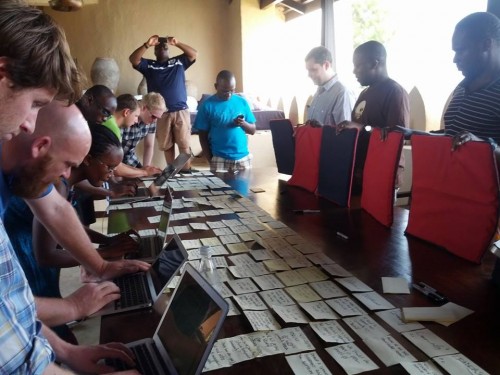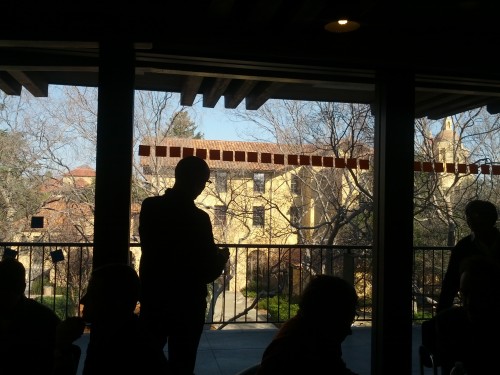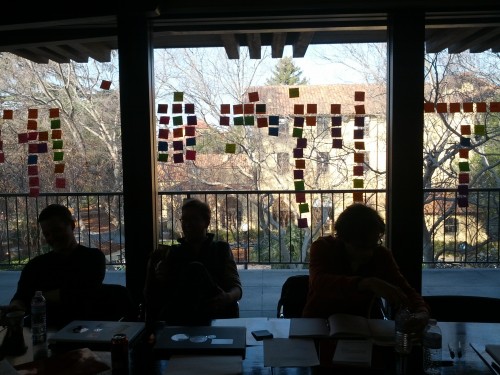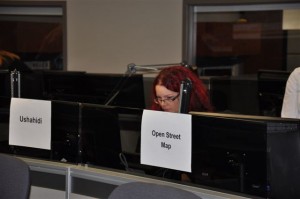Recruit, Track, Assign, and Give thanks. These are volunteer management steps in the digital age. Many organizations are looking at ways to train, incorporate and support digital skilled people in their workflows. The Crisismappers Community and the Digital Humanitarian Network (DHN) highlight the convergence of new technology/smart design like open badges, digital community networks and making. How do we get the next 10, 000 participants in a community? How do we manage the surge of new digital humanitarians and make it a valuable experience?
At Mozilla Drumbeat in 2010 (precursor to Mozfest), I joined the first ever Open Badges hackteam. We spent the weekend talking and building around the idea of credentials. Fast forward 4 years, I joined a Mozfest team in the Emergency Hack Lab. We brainstormed on a technical workflow for badging using the scenario of Hurricane Sandy.
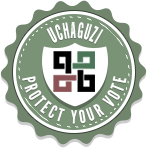
Cracking crowdsource or brainsourcing has been a mighty task that many are working on. We as organizers know that anyone who wishes to get involved is a gift for community. We know that there are small asks and big tasks for engagement. Tackling digital knowledge skills with surge support can be a full-time job during an emergency. We all have networks and there are a number of strong community groups or NGOs that are building better methods to train and support digital humanitarians. Last year I lead a digital community mapping effort called Uchaguzi for the Kenya Elections. The Ushahidi designer, Jepchumba, created badges for all the participants to use. This was to build solidarity and give thanks. Crowdcrafting (micromappers) was used during the Typhoon Haiyan (Yolanda). I wrote a bit about ‘hacking’ during the Typhoon response mainly due to the sheer volume of emails and conversations.
Building Use Cases
We could use Open Badges for UN OCHA/Noun Project icons (emergency standard) Digital Humanitarians and emergency wayfinding. Earlier this week I pitched it on our Emergency Hack Lab call, including our partners at Geeks without Bounds.
Humanitarian OpenStreetMap and Open Badges
Digital humanitarians need to build trust and get thanks. Open Badges across the various communities enables standards but also gives recognition and thanks. The DHN really helps digital volunteers join specific skillset groups. The ideal is that the volunteer engagement occurs via these individual organizations. DHN exists to connect people to real actionable tasks to solve real world problems.
Example:
The Humanitarian OpenStreetMap had over 1600 mappers do over 3 million edits for the Typhoon Response. We are part of DHN. With the help of Imagery to the Crowd and many other partners, the community received imagery which was added to the Task Manager. The task manager organizes the imagery into tiles and helps digital mappers coordinate. They sign in with their OSM account.
How easy would it be to add an HOT OSM Badge into this process? There are two core goals with this concept: credentials and thanks. HOT participants could use these for their social media or linked in profiles. Or, Open Badges could be used on the Task Manager or OSM Wiki. As a HOT board member, I continue to think about how to help thank the virtual, global community. Open Badges allows us potentially solve a gap.
Learn more Haiyan response from my fellow HOT OSM Board member, Harry Wood. (podcast)
Murmur + Wayfinding:(SMS solutions)
Ever since Hurricane Sandy I have been thinking about the power of Wayfinding during an emergency and how to connect and map community responders. Jess Klein, Creative lead of Open Badges has been a big inspiration on this journey. As well, Daniel Latorre of Wise City worked with Occupy Sandy communities to design and sign.
It struck me that Murmur plus Wayfinding plus Open Badges might be a way to connect those amazing ‘first responders’. While they may not be associated with formal organizations or NGOs, there are some community responders who make a huge difference in the field. Jess has written about this importance in response to Hurricane Sandy.
[murmur] is a documentary oral history project that records stories and memories told about specific geographic locations. We collect and make accessible people’s personal histories and anecdotes about the places in their neighborhoods that are important to them.
Around Toronto there are Murmur signs. You call the number on the sign and you get a poem or story about the space or area. It is sheer magic in community and public spaces. Well, if Wayfinding is amazing to help people design and coordinate and Open Badges assigns and gives thanks, why not add an SMS number to sign up to volunteer, get SMS tasks and plus, a Badge. This idea about SMS task management is not new, but is missing is the pieces of thanks with Open badges.
Example: A Wayfinding sign is designed using the UN OCHA/Noun Project Label, but also includes and SMS number. This SMS number ties to the volunteer management choice of the community plus Open Badges. The NGO could use any number of SMS apps to help manage the volunteers and link them to an Open Badge process. Some examples include Frontline SMS, Medic (sim apps), Swara (Interactive Voice Response tool) or many others. The goal here would be to recognize mobile plus open badges as the way forward, especially in the majority of the world.
This idea needs more work, but you get the picture. The power of Open Badges during a Crisis is full of thanks.
****
There is much more thinking and hacking to happen, but it is an exciting journey.
Join the next Open Badges call
